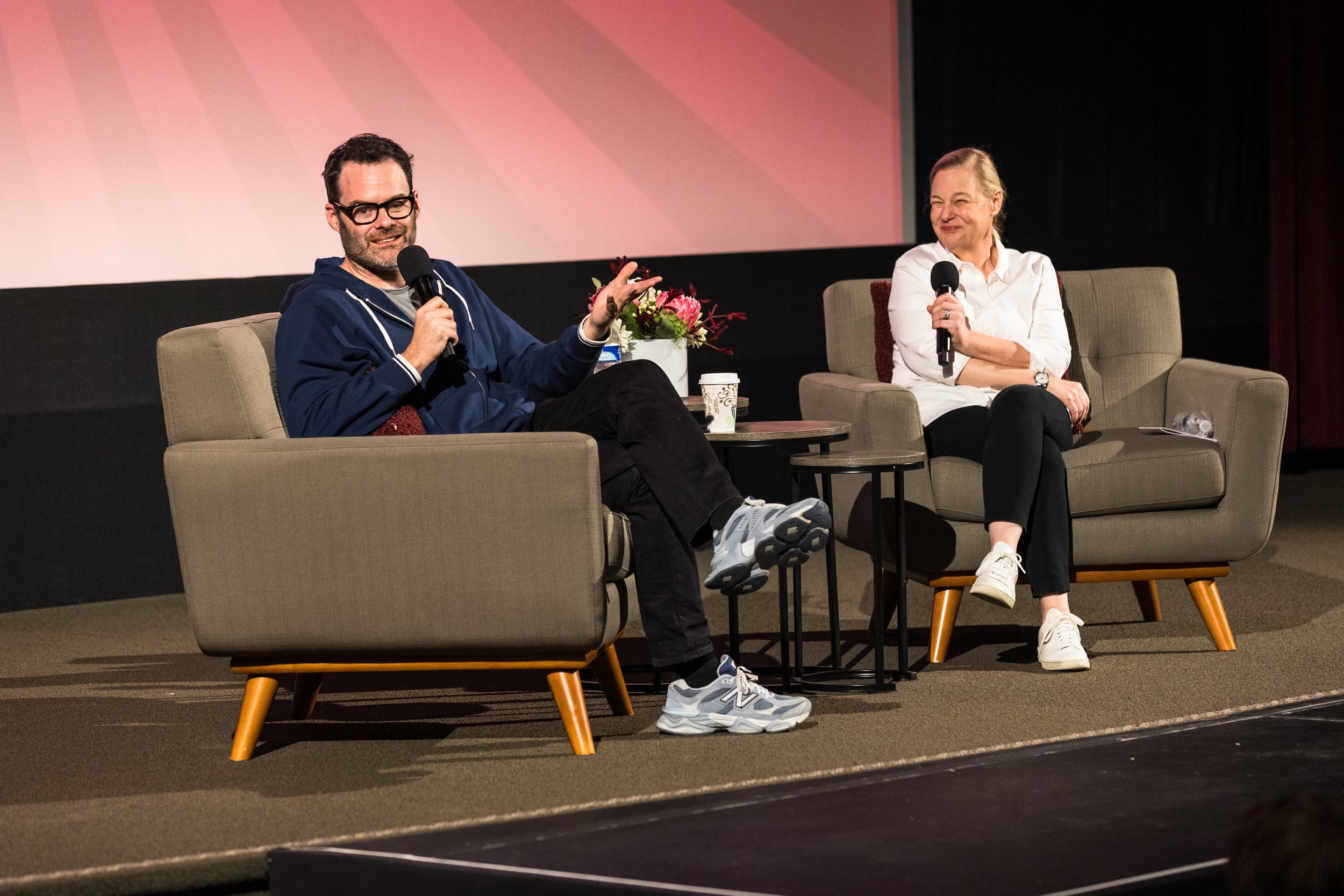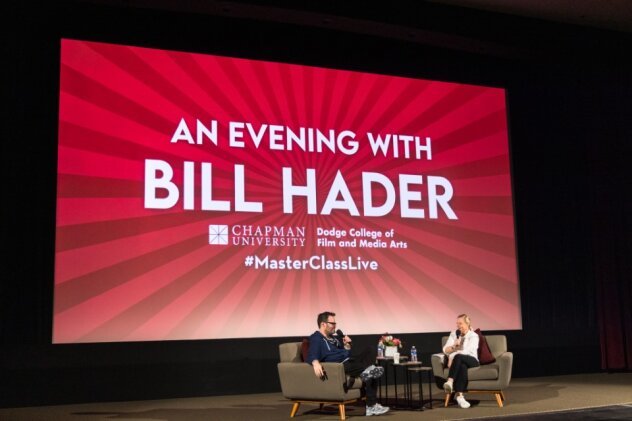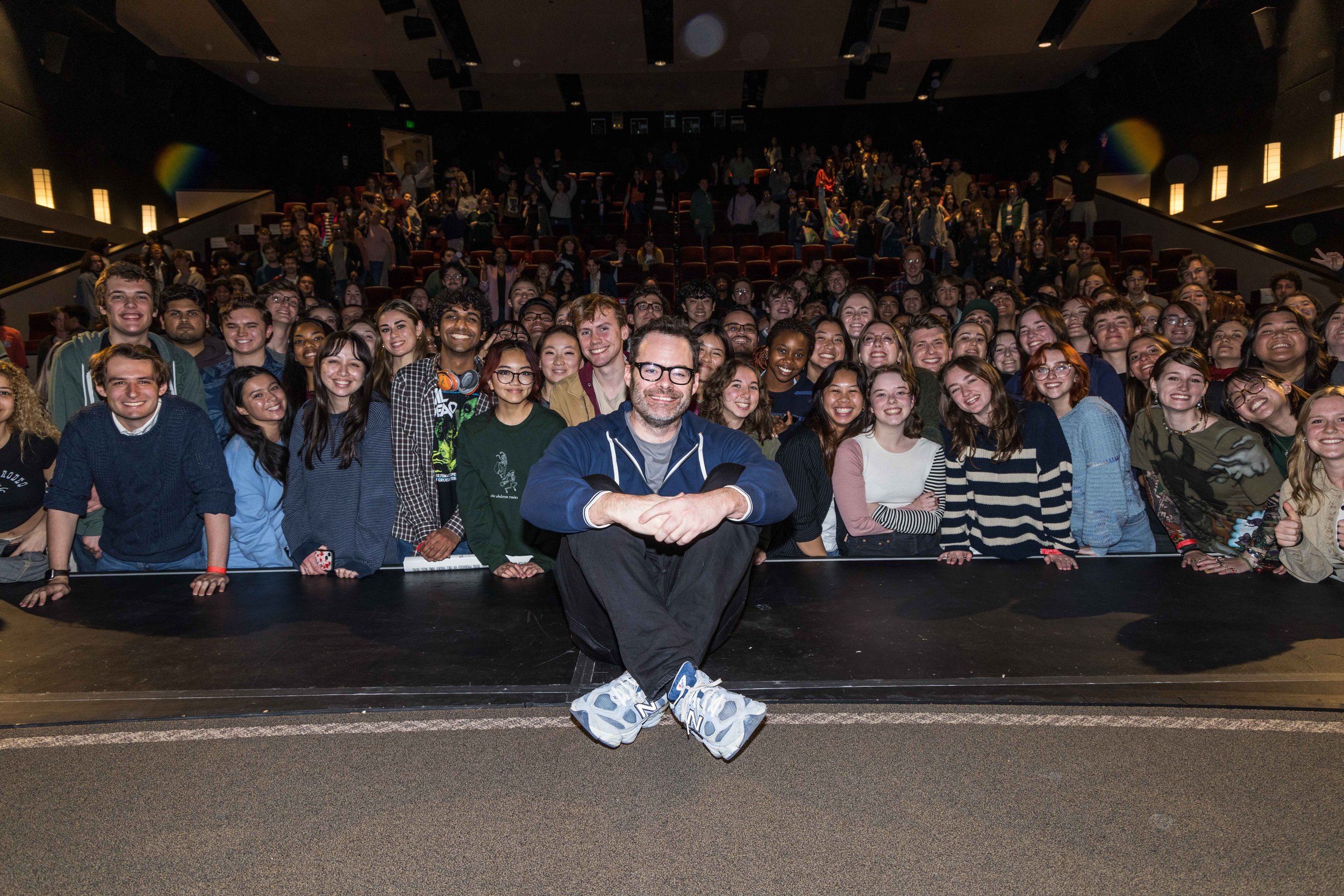Bill Hader discusses his creative evolution at Master Class
On March 11, writer, director and actor Bill Hader came to the Folino stage at the Dodge College of Film and Media Arts to discuss his award-winning series ‘Barry’ and his transition from comedic spaces to more dramatic ones. Photos courtesy of Matt Harbicht
Although he is known primarily for his comedy — particularly during his tenure on “Saturday Night Live” where he played iconic characters like Stefon, Vinny Vedecci or Anthony Peter Coleman — Bill Hader is a cinephile through and through. Whether he’s picking DVDs from the Criterion Collection closet or guest programming on Turner Class Movies, the writer-actor-director classifies himself as a film nerd who loves to point out niche character actors and talk about obscure films.
“You don’t want to watch a movie with me. It’s the most annoying thing on the planet,” Hader said.
On March 11, Hader was welcomed by a room full of cinephiles and aspiring filmmakers in the Folino Theater. He addressed an audience of Chapman students and faculty after screenings of three episodes of his 2018 HBO dark comedy “Barry.” The show follows a hitman who starts to reconsider his way of life after stumbling into an acting class, and just wrapped up after its fourth and final season.
Two of the episodes screened earned Hader Emmy nominations for directing a comedy series. The master class was moderated by Jill Condon, the assistant professor of artistic faculty and the director of the MFA Showrunner program at Chapman.
Hader revealed his cinematic ambitions go back to his childhood, where he made films with his sisters and created a show for his high school. One of Hader’s most impactful experiences that led him to direct was a star-studded Thanksgiving feast with comedic actor Ben Stiller in attendance. The 17-year-old couldn’t help but ask him what now seems like an embarrassing question.
“I did that thing. I was like, ‘Would you see my movie I made?’ and he was like, ‘Yeah,’” Hader said. ”Then I ran home and got it and brought it back, and he watched it… He described shots that he liked…”
Later on, when Hader moved to Los Angeles, Stiller invited him to hang out on the set of the comedy classic “Zoolander,” which Stiller directed. Years later, after watching Hader on SNL, Stiller would enlist Hader to appear in his film “Tropic Thunder.” While it may seem like divine intervention, Hader was careful to note that his creative path has had its fair share of bumps.
“Bad shit has happened in my life too. Tons of bad shit. I'm not one of those (people) where it's like, oh, you just trip over, and Ben Stiller gives you a job,” Hader said.
Condon expressed the excitement she felt after Joe Rosenberg, the director of the Career Center for the Dodge College of Film and Media Arts, reached out back in mid-January about interviewing Hader.
“I love ‘Barry,’ so I was looking forward to discovering how he came up with both the show and the arcs for each season,” Condon said in an interview with The Panther.
To prepare for the interview, Condon listened to “a ton of podcasts” and read into Hader’s background.
Hader’s creative journey has taken quite a few unexpected turns. He started out taking on jobs as a production assistant for films like the first “Spider-Man,” starring Tobey Maguire, and “Collateral Damage,” starring Arnold Schwarzenegger. Schwarzenegger, at one point, pressured Hader to show him “his leadership capabilities,” as Hader hilariously recounted.
In the meantime, Hader was attempting to hit the ground running on his own films but caved to the criticism of his friends and his own fear of failure.
“(Hader) is a true film nerd. He loves talking about lenses and shots and all the nitty gritty. He loves watching films, talking about them... He’s the real deal. It was great to see how much he truly loves the whole craft.”
To boost his confidence, he started to take improv classes in Los Angeles, which would set him on the course toward “Saturday Night Live,” thanks to Megan Mullally, who saw one of his improv shows and gave his name to SNL mastermind Lorne Michaels.
Being surrounded by improv heavyweights like Jason Sudeikis and Tina Fey, Bill Hader worked to find where he fit in at Saturday Night Live. Even before he got hired, he found himself intimidated by a fellow candidate he met riding in the same elevator, carrying tons of props for his audition — that prop-laden comedian turned out to be Andy Samberg.
Searching for a way to set himself apart, Hader decided that impressions would be his specialty, writing two sketches a week built around impressions and then working on his original characters. This philosophy of improvement, even when imposter syndrome sets in, extended to when he left the show and sought to write better and do dramatic acting. He aligned himself with the comedic duo Trey Parker and Matt Stone and the folks at Pixar, where he watched the creative evolution of both “Inside Out” and a season of “South Park.”
Hader had experience writing from SNL but felt he had leaned on other writers there like John Mulaney and Simon Rich. He sought to really hone in on his craft independently.
“I felt like if I could learn how to write, I (could) control my destiny in a way… If I know how to write, then everything kind of comes from the idea…That’s really good if you can see what a script needs, the story needs. (My scripts) were not working, and so I was like, let me hang at Pixar because they know how to write. I love how their stuff is structured…Then, I met Matt Stone from ‘South Park,’ and we went and (I) hung out there and watched them work, and it was so invaluable.”
At Pixar, Hader learned the value of failure and understanding how to put every facet of the story under suitable scrutiny, even if it took years. Every time Hader would come back to the writer’s room, the movie would look completely different. At “South Park,” watching creators Stone and Parker crack an episode taught Hader principles of story and the importance of logic and emotion within a story, but in a much shorter period, given the show’s weekly release.
“If you found something that was really funny, that made us all laugh, that was inspired, you would try really hard to keep that in,” Hader said. “‘South Park’ was a great training ground. I wouldn’t have been able to do ‘Barry’ without ‘South Park.’”
Beyond stories about his own beginnings, like showing up to his first production assistant job with his college degree, and encounters with SNL alumni, Hader ended the night by emphasizing the importance of making things. He talked about overcoming your own self-doubt, even if the things you’re making go against the norm, whether it’s the adventures of foul-mouthed elementary schoolers, the complicated activity within a teenage girl’s brain or a hitman trying to heal through acting classes.
“Expressing yourself doesn’t mean what everybody else is liking…Everybody I admire always (say) when they started out, people were like ‘What are they doing?’” Hader said. “Just do it…Make sure you’re constantly making stuff…It’s really easy to lose that…so don’t lose that.”
Dodge College of Film and Media Arts Master Classes are available to all Chapman students and alumni. Seats are available either on a first-come, first-served basis or by lottery system, depending on the Master Class. Dates, times, upcoming guests and additional information can be found in the lobby of Marion Knott Studios or on the Dodge College Instagram account.



